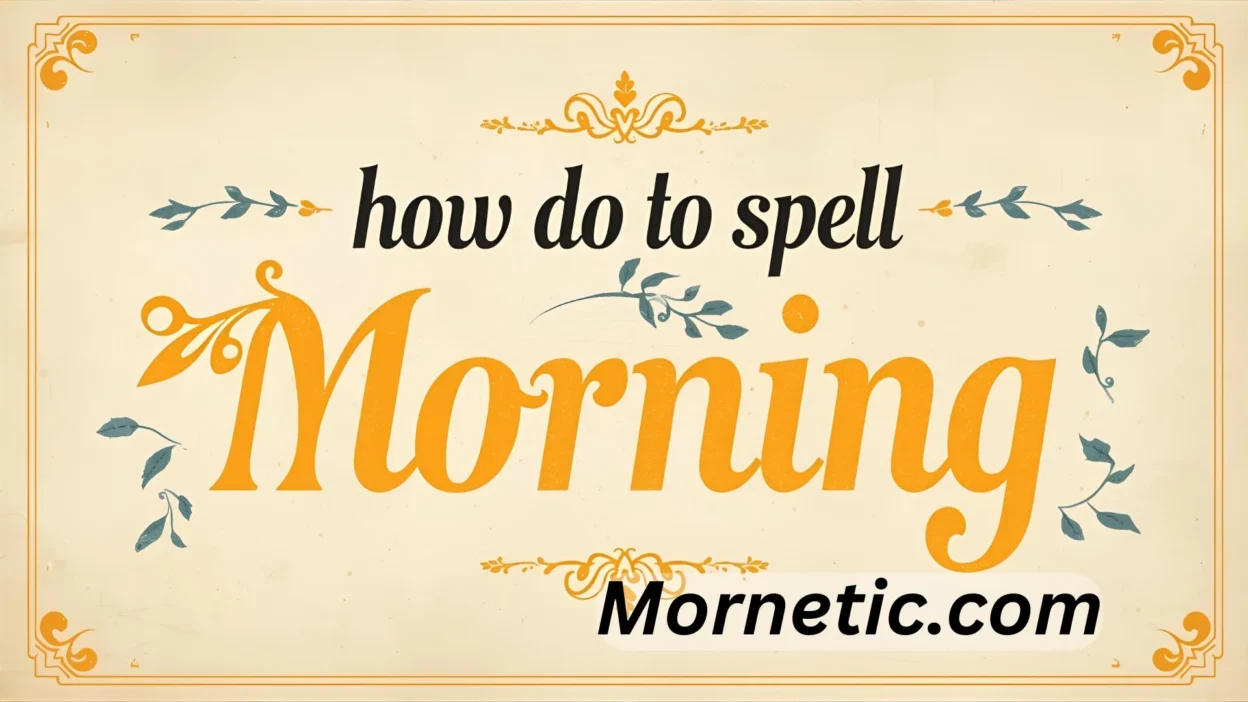You probably use the word “morning” every single day. However, in a sleepy haze or a moment of doubt, you might suddenly wonder: how do you spell morning? You are certainly not alone. This common word can sometimes trip up even proficient English speakers. Is it one ‘n’ or two? To clear up any confusion, this guide provides not just the correct spelling but also a deep dive into everything about this essential word.
The correct spelling is M-O-R-N-I-N-G. This seven-letter word has two syllables: “morn” and “ing.” Furthermore, its spelling remains consistent across all major English dialects. In the sections below, we will explore why people often question this spelling, break down common errors, and uncover the rich meaning behind the word that starts our days.
What is the Correct Spelling of Morning?
Let’s start with the absolute basics. Without a doubt, the word “morning” is spelled M-O-R-N-I-N-G. It primarily functions as a noun. Typically, the most common point of confusion lies in the double ‘n’. Many people, typing quickly or relying on phonetic memory, mistakenly use a single ‘n’.
- M-O-R-N-I-N-G ✅ (Correct)
- M-O-R-N-I-N-G ❌ (Incorrect)
- M-O-R-N-I-N ❌ (Incorrect)
- M-O-R-N-I-N-G ❌ (Incorrect)
As a helpful trick, remember that the root is “morn” with the “-ing” suffix attached. This mental connection can lock in the correct spelling.
Common Misspellings of “Morning” and Why They Happen
Understanding common errors is the first step toward avoiding them. Here are the most frequent misspellings of “morning” and the linguistic reasons behind them:
- “Morning” 🚫: Primarily, this error occurs due to over-simplification. We often hear the word pronounced with a single, fluid ‘n’ sound, which leads to omitting the second ‘n’ in writing.
- “Mornin” 🚫: Essentially, this is an informal, phonetic spelling that mimics a casual pronunciation. However, it is not acceptable in formal writing.
- “Monring” 🚫: This is usually a classic typographical error from typing too fast, where the ‘r’ and the ‘n’ get transposed.
- “Mouring” 🚫: Generally, this mistake happens when the writer confuses the word with “mourning” (which means to grieve).
The Etymology and History of the Word “Morning”
The story of “morning” takes us on a fascinating journey through the English language. Knowing its origin makes the spelling much more logical and memorable.
- From “Morn” to “Morning”: The word originates from the Middle English “morwenynge,” which itself evolved from the Old English “morgen.” Initially, this meant the dawn or the coming of day.
- The “-ing” Suffix: The “-ing” was added to create a noun form. Similarly, “evening” came from “even.”
- A Germanic Root: The word shares roots with similar words in other Germanic languages, like the German “Morgen.”
“Morning” vs. “Mourning”: A Homophone Showdown
This pair represents one of the most significant sources of spelling confusion. “Morning” and “mourning” are homophones—they sound identical but have completely different meanings and spellings.
- Morning (M-O-R-N-I-N-G): This word refers to the early part of the day, from sunrise to noon.
- Example: “The sun rose on a beautiful morning.”
- Mourning (M-O-U-R-N-I-N-G): In contrast, this word refers to the expression of deep sorrow, especially for someone who has died.
- Example: “The whole country was in mourning after the tragedy.”
Pro Tip: You can remember the ‘u’ in “mourning” by associating it with the ‘u’ in “sadness.”
Using “Morning” in a Sentence: Context is Key
Using a word correctly in context reinforces its proper spelling and meaning. Thankfully, “morning” is versatile and fits into several grammatical constructions.
- As a simple noun: “I love the quiet of the early morning.”
- As part of a greeting: “Good morning, everyone!”
- To indicate a time: “The meeting is scheduled for tomorrow morning.”
- As an adjective: “She follows a strict morning routine.”
The Many Meanings and Connotations of “Morning”
Beyond just a time on the clock, “morning” carries powerful symbolic weight in our culture and daily lives.
- A New Beginning 🌅: Universally, morning symbolizes a fresh start, hope, and new opportunities. For instance, phrases like “tomorrow is a new day” are rooted in this concept.
- A Time of Peace and Productivity: For many, the morning represents a quiet, undisturbed period for meditation, exercise, or focused work.
- A Specific Period: In a practical sense, “morning” defines the hours between approximately 5:00 AM and 12:00 PM (noon).
Creating an Unforgettable Morning Routine for Success
How you spell “morning” is one thing; how you use your morning is another. Consequently, a structured morning routine can set a positive tone for your entire day.
- Hydrate Immediately 💧: Drink a large glass of water to rehydrate your body after a night’s sleep.
- Move Your Body: Even 10 minutes of stretching or a brisk walk can boost your energy and mood.
- Practice Mindfulness: Spend 5-10 minutes in meditation or journaling to center yourself.
- Tackle Your Most Important Task (MIT): Use your morning mental clarity to complete your most challenging work first.
- Avoid Your Phone: Try to resist checking emails or social media for at least the first 30-60 minutes of your day.
Famous Quotes About the Morning to Inspire Your Day
Thinkers, writers, and leaders have celebrated the beauty and significance of the morning for centuries.
- “Each morning we are born again. What we do today is what matters most.” – Buddha
- “Morning is an important time of day because how you spend your morning can often tell you what kind of day you are going to have.” – Lemony Snicket
- “The sun himself is weak when he first rises, and gathers strength and courage as the day gets on.” – Charles Dickens
The Grammar of Greetings: “Good Morning” Etiquette
The phrase “Good morning” is one of the most common uses of the word. Let’s break down the grammar and etiquette.
- Capitalization: “Good morning” is typically lowercase unless it’s starting a sentence.
- Example: “Good morning, John. It’s nice to see you.”
- Punctuation: When used as a greeting, it is usually followed by a comma.
- Formality: “Good morning” is considered standard and polite. In contrast, a simple “Morning!” is often acceptable in informal settings.
How to Teach the Spelling of “Morning” to Children
For young learners, spelling can be a challenge. Therefore, here are some engaging, multi-sensory methods to help a child learn.
- Use a Song or Chant 🎵: Create a simple, catchy tune that spells out M-O-R-N-I-N-G.
- Kinesthetic Learning: Have them write the word in a tray of sand or with finger paints.
- Visual Association: Draw a picture of a sunrise and write the word “morning” across the sun’s rays.
- Break it Down: Teach it in syllables: “morn” – “ing.” Additionally, clap for each syllable to reinforce the rhythm.
The Science of Morning: How Light Resets Your Body
The concept of “morning” is deeply wired into our biology. Understanding the science can give you a new appreciation for this daily phenomenon.
- Circadian Rhythms: Your body has a 24-hour internal clock that light in the morning primarily resets.
- Cortisol Awakening Response: Your body naturally releases a spike of the hormone cortisol shortly after you wake up. This process helps you feel alert and ready for the day.
- Blue Light: Exposure to natural morning sunlight, rich in blue light, signals to your brain that it’s time to be awake.
Digital Tools to Never Misspell “Morning” Again
In our modern world, technology offers several fail-safes to ensure your spelling is always correct.
- Grammar and Spell Checkers: Tools like Grammarly will instantly flag misspellings like “morning.”
- Dictionary Apps: Keep a trusted dictionary app on your phone for a quick, authoritative reference.
- Voice-to-Text: Using dictation features can bypass spelling anxieties altogether, as the software correctly interprets the spoken word.
Beyond the Basics: Idioms and Expressions with “Morning”
The word “morning” is embedded in many common English idioms, which enriches our language.
- Morning person: Someone who is alert and energetic in the early hours.
- Monday morning quarterback: Someone who criticizes or offers advice about an event after it has happened.
- The morning after (the night before): This phrase refers to the feeling of hangover or regret following a night of excess.
Frequently Asked Questions (FAQ) About “Morning”
How do you spell morning correctly?
The correct spelling is M-O-R-N-I-N-G.
What is a common misspelling of morning?
The most common misspelling is “morning” (with one ‘n’).
What is the difference between morning and mourning?
“Morning” is the time of day after sunrise. “Mourning” is the act of expressing grief or sorrow, typically after a death.
What part of speech is morning?
“Morning” is primarily a noun, but it can also be used as an adjective (e.g., “morning coffee”).
Why is it important to spell morning correctly?
Correct spelling ensures clear communication, appears professional in formal writing, and is a fundamental aspect of literacy.

Grace is a lifestyle writer from California who loves starting mornings with positivity. At Mornetic, she shares uplifting quotes and cheerful messages to brighten your day.




